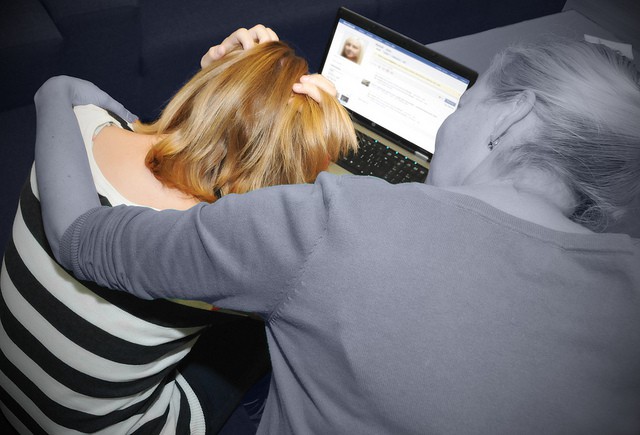by self-help expert Dr Pam Spurr.
Your life online can be fun and adventurous. A place to hang out with friends, make new ones, discover new things, find out about your fave bands or stuff to do.
But it’s a sad fact that not everyone online has good intentions. You might’ve seen others being bullied, stalked and/or harassed online. Until it’s happened to you it’s hard to understand how devastating it can be.
And if it does happen to you, it’s important to know how to get help.
Below I include helpline information. But let’s start with:
Tips to keep you on top of things when online
- First and foremost if something makes you uncomfortable, trust your gut feeling! Intuition is powerful – it’s our warning system that something isn’t right.
So if someone makes a bad comment to you, or seems like they want something from you, break off communication. - If someone keeps pestering you, despite you breaking contact, report it. Everyone has a right to be online without being harassed.
- If it’s nasty or bullying comments then also report it. All social networks have reporting facilities.
- Do tell a parent or trusted adult you’ve had an unhappy experience online. It’s true – when you share a worry you start to feel better. Keeping painful or upsetting online-incidents to yourself can make you feel worse.
Although parents may seem a pain at times, they want to know if you’re facing an online (or other!) issue. - Never feel guilty you’re causing a ‘fuss’ because you report something that’s happened. For starters, it’s never your fault. Also, social networks and responsible adults want to know if someone’s causing problems online. Reporting abuse/bullying/bad behaviour is a good thing!
- If a friend pressures you to do something online – like to post a revealing/sexual selfie – resist the pressure. Even friends make bad judgements. Sometimes if they’ve posted something daring/sexual online, they then want a friend to do so too.
Keep it simple responding to friends: repeat the same message that, “I don’t want to do that so stop asking me.” - You might be worried by a friend’s behaviour online. Maybe you’ve even told them that, for example, you don’t think they should ‘sext’. It’s fallen on deaf ears and you don’t know what to do. Keep being there for them. Let them know you care about them.
They might do things online because they want attention. Or they’ve been pressured by someone. If really concerned about a friend’s online behaviour, ask a parent or trusted teacher to help. - If you see someone being bullied or harassed like in a chat room – even if you don’t know them – report it. Keeping a chatroom safe means you keep it safe for you too.
- Remember people lie all the time online. Even people who seem friendly. It’s not the same as someone you know from school, college or work.
Someone who says they’re an 18-year-old, may be a 38-year-old. Never meet in person anyone you’ve met online, unless you can verify who they are. Or you know for a fact they know a friend of yours.
Don’t go to meet them alone. Take a friend. If the person’s upset you’re not coming alone then something’s very suspicious.
For more advice please check the following organisations
- Childline – 0800 1111 – www.Childline.org.uk
- Stop Hate UK – visit their website for info on helplines in your area – www.stophateuk.org
- Bullying UK – for bullying, harassment and abuse – 0808 800 2222 – www.bullying.co.uk
- Report It – for bullying, harassment and abuse – www.report-it.org.uk
- National Stalking Helpline – including online stalking – 0808 802 0300 – www.suzylamplugh.org
- Victim Support – www.victimsupport.org.uk
And don’t forget your local police want to know about online crimes. There are various laws against stalking and harassment, so do report it.
About the author: Dr Pam Spurr is an award-winning radio presenter, agony aunt, relationship, sex and behaviour expert, and life coach. Dr Pam is the author of 14 self-help books on topics including sex, dating, happiness, emotional eating and dream interpretation. She has appeared as a contributor on TV programmes including This Morning, Loose Women, LK Today, Daybreak, GMB, The Wright Stuff, BBC Breakfast, and for ten years running as a resident behaviour expert on Big Brother’s Little Brother and Big Brother’s Bit on the Side. Pam has a doctorate in psychology from a London teaching hospital and is a chartered research, academic and teaching psychologist. Her doctoral and postdoctoral research looked at parenting/family issues.
You can follow Dr Pam @drpamspurr or visit her website at www.drpam.co.uk.
image: Pro Juventute - Stopp Cyber-Mobbing Kampagne © Pro Juventute_05 by Pro Juventute under Creative Commons license




